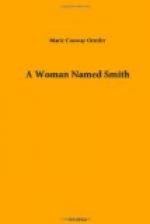Then with feverish haste I got the Hynds jewels back into the buckskin bag. I hadn’t the faintest notion as to their actual value, though I knew it must be considerable—enough to make up to Nicholas Jelnik the losses he had sustained; enough to decide his fate—and mine. Even now he was packing to go; even now there were “For Sale” signs on the gray cottage.
I ran into our living-room, snatched my sewing-bag from the sewing-stand, and dropped the heavy bag into it. That looked more commonplace.
The clamor from the kitchen, incident upon Beautiful Dog’s having taken refuge under Mary Magdalen’s skirts, had died down. I knew that Beautiful Dog was licking his wounds after defeat, and the Black cats, sedate and mild-mannered, were licking their paws after victory. I determined that from that afternoon Beautiful Dog should become an honored and important institution in Hynds House. If I had to choose a new family escutcheon, I think I should insist upon having Beautiful Dog rampant upon it!
When I went outside, the garden was a gray-green gloom of flying leaves and twisting tree-branches bending before the stiff northeast gale. It was wild weather—weather that sent the blood tingling through the veins and whipped red into one’s cheeks.
I got into Mr. Jelnik’s grounds through the hedge behind the spring-house, and ran like a hare through his garden. I had to hammer upon his door before I could make Achmet hear me, so loud and surf-like was the noise of the wind in the trees.
The Jinnee stepped back and salaamed, his hands upon his breast. Then he laid a finger upon his lips, for from up-stairs came the wailing outcry of a violin.
The Jinnee looked thin and old. His garments hung loose upon his shrunken frame. There was trouble in that house, he told me. The master had wished to send Daoud away. Daoud had refused to go. To leave one’s lord when calamity came upon him was to shame one’s beard. It was the act of the infidel, not the behavior of the faithful, and Daoud had threatened to shave his beard, put on the dress of a pilgrim, and beg his way from Hyndsville to Mecca. He was even now kneeling upon a prayer-mat reciting a four-bow prayer. As for the master, for two days he had not eaten; he merely swallowed a cup of coffee in the morning because Achmet wept. This afternoon he had fled to his violin for relief. Verily, God was afflicting them! “The bad fortune of the good turns his face to heaven, even as the good fortune of the bad bends his head to the earth. It is the will of God: Islam!” said The Jinnee, simply.
“I must see Mr. Jelnik, now, this minute! I have news for him,” I said hastily.
The Jinnee looked doubtful. Plainly, he didn’t want his master disturbed, even by me. “I have never seen him like this before,” he told me. “Listen!”
Came the cries of the violin, heart-rending cries of regret and despair, followed by furious protests; then a nobler grief, and love, and longing.




